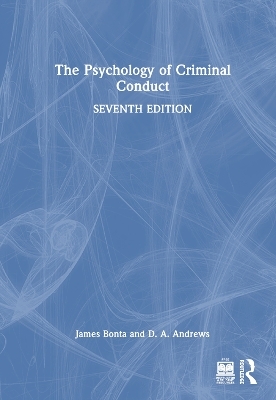
The Psychology of Criminal Conduct
Routledge (Verlag)
978-1-032-27283-2 (ISBN)
Bonta carefully maintains the book’s original contributions while presenting core concepts succinctly, clearly, and elegantly. Appropriate for advanced undergraduates and graduate students as well as for scholars, researchers, and practitioners, The Psychology of Criminal Conduct, Seventh Edition, further extends and refines the authors’ body of work.
The book is extended and enhanced by a website that includes:
A curated selection of videos, webinars and podcast episodes, bringing together diverse voices from leaders across the field of corrections and criminal psychology
Technical notes providing additional context and detail to concepts explored in the book
Interactive quizzes to test understanding and support study
Lecture slides, exercises and test banks designed to save instructors time
James Bonta served as Director of Corrections Research at Public Safety Canada from 1990 until 2015. He received his PhD in Clinical Psychology from the University of Ottawa in 1979. Bonta was a psychologist, and later Chief Psychologist, at the Ottawa-Carleton Detention Centre, a maximum-security remand facility for adults and young offenders. Throughout his career, Bonta has held various academic appointments and professional posts. He is a Fellow of the Canadian Psychological Association, a recipient of the Association’s Criminal Justice Section’s Career Contribution Award for 2009, the Queen Elizabeth II Diamond Jubilee Medal, 2012, the Maud Booth Correctional Services Award, 2015, and the 2015 Community Corrections Award from the International Corrections and Prisons Association. The late D.A. Andrews was a noted psychologist affiliated with Carleton University throughout his academic career. His work on the psychology of criminal conduct produced what became known as the "theory of correctional intervention," which set the standard for successful intervention practices throughout the field of corrections worldwide. He was a founding member of Carleton’s Criminology and Criminal Justice Program and a Fellow of the Canadian Psychological Association.
Part 1: The Theoretical Context and Knowledge Base to the Psychology of Criminal Conduct
Chapter 1: An Overview of the Psychology of Criminal Conduct
Chapter 2: The Empirical Basis to the Psychology of Criminal Conduct
Chapter 3: From Criminology Theories to a Psychological Perspective of Criminal Conduct
Part 2: The Major Risk/Need Factors of Criminal Conduct
Chapter 4: The Biological Basis of Criminal Behavior
Chapter 5: Antisocial Personality Pattern
Chapter 6: The Role of Procriminal Associates and Attitudes in Criminal Conduct
Chapter 7: The Person in Social Context: Family, Marital, School, Work, Leisure/Recreation, and Neighborhood
Chapter 8: Substance Misuse
Part 3: Applications
Chapter 9: The Risk-Need-Responsivity Model of Assessment and Treatment
Chapter 10: Prediction and Classification of Criminal Behavior
Chapter 11: Rehabilitation
Chapter 12: Creating and Maintaining RNR Adherence: A Real-World Challenge
Chapter 13: The Failed Experiment: Getting Tough on Crime
Chapter 14: Criminal Subtypes: Intimate Partner Violence, the Mentally Disordered, and Sexual Offenders
Part 4: Summary and Conclusions
Chapter 15: A General Personality and Cognitive Social Learning Perspective of Criminal Conduct: Summary and Conclusions
| Erscheinungsdatum | 03.10.2023 |
|---|---|
| Zusatzinfo | 54 Tables, color; 25 Line drawings, color; 8 Halftones, color; 33 Illustrations, color |
| Verlagsort | London |
| Sprache | englisch |
| Maße | 178 x 254 mm |
| Gewicht | 1420 g |
| Themenwelt | Geisteswissenschaften ► Psychologie ► Test in der Psychologie |
| Geisteswissenschaften ► Psychologie ► Verhaltenstherapie | |
| Naturwissenschaften ► Biologie ► Zoologie | |
| Recht / Steuern ► Strafrecht ► Kriminologie | |
| Sozialwissenschaften ► Pädagogik ► Sozialpädagogik | |
| Sozialwissenschaften ► Soziologie | |
| ISBN-10 | 1-032-27283-X / 103227283X |
| ISBN-13 | 978-1-032-27283-2 / 9781032272832 |
| Zustand | Neuware |
| Informationen gemäß Produktsicherheitsverordnung (GPSR) | |
| Haben Sie eine Frage zum Produkt? |
aus dem Bereich


